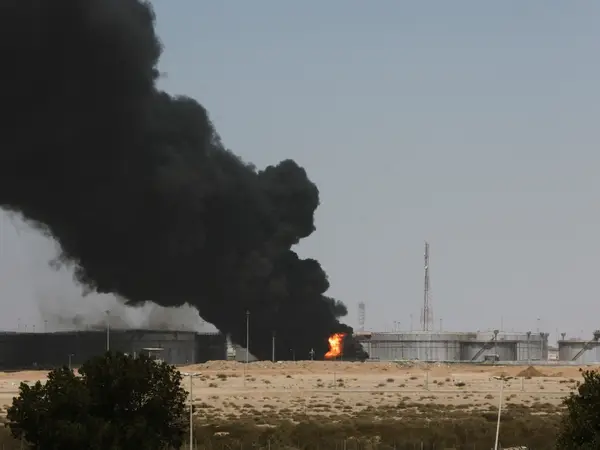As Yemen’s Houthi rebels attacked Saudi oil facilities, Iran claimed it had increased its oil output potential to 3.8 million bpd amid a surge in energy prices.
The Iranian oil ministry's public relations on Friday said Iran's capacity for drilling and extracting oil has now surpassed the level before sanctions were imposed by the United States in 2018 and reached 3.8 million barrels per day.
Crude oil prices surged to over $120 per barrel after Friday's Houthi attack and again, following Saudi retaliatory strikes on Saturday. World energy prices have surges after Russia’s invasion of Ukraine and Saudi oil is seen as crucial to fill any void in case of more sanctions against Moscow.
Saudi Arabia has said that it will not be held responsible for any global shortage of oil resulting from Houthi's Friday attack on its Aramco facilities by Iran-aligned Houthi rebels of Yemen.
The Houthi attacks on Friday were carried out ahead of the 7th anniversary of a Saudi-led coalition's military intervention against the Iran-backed Houthis in Yemen. Two large oil reservoirs in Jedda caught fire in the attacks and were burning until midday Saturday.
Iranian officials have not commented directly on the Houthi attack but state-run media say Houthis have "defeated" Saudi Arabia. "The national army and Ansarallah have the upper hand now. They strike any target in Saudi Arabia with their missiles and drones despite being named the weakest Arab army in 2015 when the war started," the official news agency IRNA wrote Saturday.
On Friday Tehran Municipality beamed images of Houthis leaders Hussein Badreddin al-Houthi and its current leader Abdul-Malik Badruldin al-Houthi on the Azadi monument in Tehran. The 3-D video-mapping presumably marked the 7th anniversary of the war in Yemen which the Houthis have designated as the National Steadfastness Day.
The Saudi-led coalition on Saturday unleashed a barrage of overnight airstrikes on the Yemeni capital Sanaa and Hodeida, a strategic Red Sea city in retaliation for the Houthi attack on Aramco oil depot in Jiddah on Friday.
According to the state-run Saudi Press Agency, a spokesman for the Saudi-led coalition, Turki al-Malki, said on Saturday that the strikes aim to "protect global energy sources and ensure supply chains" and that the operation would continue until it achieves its goals. The operation was in its early stages and Iran-aligned Houthis should bear the consequences of their "hostile behavior", he said.
The coalition said it intercepted and destroyed two more bomb-laden drones on Saturday.
Riyadh on Saturday also requested a UN Security Council meeting to condemn the Houthi attacks. In a message to the council, the Saudi mission said the country reserves the right to take all measures to defend its territory.
Saudi Arabia accuses the Houthi militia of targeting its energy facilities and civilian areas with drones and ballistic missiles provided by Iran while the Houthis claim it is the Saudi-led coalition that carries out air strikes against Yemeni civilians in areas under its control.
Houthis have launched dozens of cross-border attacks on Saudi Arabia since September 2021.
Friday's attacks were strongly condemned by the United States, its European allies and others.
US National Security Advisor Jake Sullivan in a statement on Friday said the United States condemns the Houthi attacks and accused Iran of arms shipments to Houthis. “Today’s attacks…were clearly enabled by Iran in violation of UN Security Council resolutions prohibiting the import of weapons into Yemen.”
